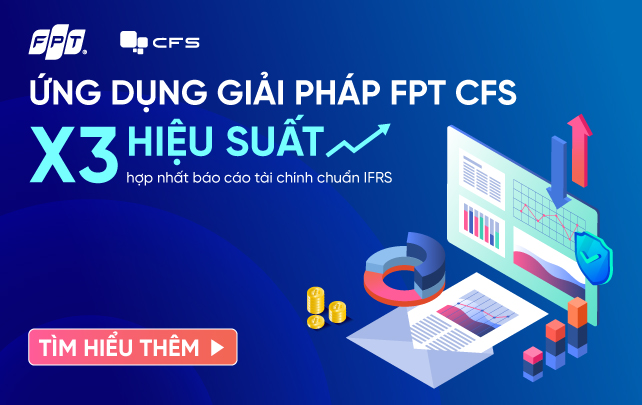Converting to IFRS is an important step, helping businesses standardize accounting and financial reporting processes, creating a common accounting language for effective communication and comparison in the international market. However, the transition to IFRS requires comprehensive preparation and reform, from knowledge, processes, to information systems and human resources.
Objective of IFRS conversion
IFRS is a set of international financial reporting standards issued by the International Accounting Standards Board (IASB). The goal of IFRS is to create a common global accounting language, helping businesses and financial institutions understand and compare financial information easily and consistently. The widespread recognition of IFRS globally shows recognition of the international nature and importance of this standard in improving the transparency and reliability of financial information in the global economic community. .
Steps to convert from VAS to IFRS
Determine the year of the first conversion
The first important step in the process of converting financial statements is that businesses need to determine the year the conversion begins. IFRS 1 – First application of IFRS requires the presentation of comparative information for the first converted financial statements. Enterprises must prepare data at least one year in advance from the year they start presenting financial statements according to IFRS. Financial statements prepared for the first time according to IFRS of an enterprise must include: statement of financial position, statement of comprehensive income, statement of cash flows, statement of changes in equity and related reports.

Identify financial statement items that have differences
Determining differences in financial statement items is a complicated step in conversion. Reviewing the Balance Sheet and Income Statement according to VAS or checking each item in detail on the Trial Balance is the best approach. After identifying discrepant items, businesses collect data and make adjustments in two steps. First, collect all VAS entries related to items that differ from IFRS from the date of origin to the reporting date. Then, determine how to record the transactions under IFRS and calculate the total adjusted value for each item on the financial statements under IFRS.
Prepare a summary table of adjustments
To prepare an Excel file summarizing the adjustments, it is necessary to include the reversing entry of the transactions recorded under VAS and the new entry recorded again under IFRS. The entries that reverse transactions under VAS are just entries that reverse the original entries. Entries recorded in the Income Statement of previous periods have been transferred to the current period’s Undistributed Earnings balance and are not recognized and reversed in the period’s comprehensive income statement. Present.
Prepare financial statements according to IFRS
After having the trial balance according to IFRS, the accountant has prepared the financial statement according to IFRS with the following notes: classifying short-term and long-term accounts according to liquidity, according to IAS 1, two parts must be presented: profit or loss statement. from operating activities and separate Statements of Comprehensive Income. The cash flow statement requires a bank overdraft in Cash and cash equivalents. The statement of changes in equity must be prepared separately. Notes to financial statements need to provide information for users to evaluate objectives, policies and capital management.

Things businesses need to prepare when converting to IFRS
Conversion according to IFRS Standard 1 – First time applying IFRS
Enterprises need to develop processes that comply with the instructions of this standard. Data conversion needs to follow a step-by-step process and requires a long enough time to prepare the relevant content. Therefore, businesses should take advantage of International Accounting Standards (IFRS) experts for advice and support in implementing this content in the most accurate and effective way.
Improve understanding for relevant personnel
Enterprises need to conduct training not only for accounting department staff but also for the Board of Directors and key managers. This ensures they have good coordination with the accounting department when required to provide or explain information and data related to IFRS. This helps provide them with the necessary knowledge and skills to apply IFRS effectively in their daily work.
Reorganize and upgrade the accounting information system
The preparation of financial statements according to IFRS has many differences in recognition, measurement of value, presentation and disclosure of information compared to current standards. Therefore, businesses need to review and make changes (if necessary) to the contents of the accounting information system to ensure suitability and stability when officially applying IFRS.
Adjust terms in economic contracts with partners
IFRS has strict requirements for determining responsibility for transferring goods or completing services. Therefore, businesses need to review contracts with suppliers and customers and compare them with IFRS contract-related requirements to make appropriate adjustments.
Anticipate negative effects (if any) on financial indicators
Before converting financial statements to International Accounting Standards (IFRS), businesses need to anticipate negative effects (if any) on financial indicators and plan appropriate responses to deal with the situation. this situation. Assets may be impaired by being revalued at fair value. The payout ratio is not guaranteed because when converting to IFRS, some cash flows in the financial statements may change. In addition, revenue may be impaired when recognized under the new accounting policy because the revenue recognition principles in IFRS may be different from the previous principles.
To successfully apply IFRS in the coming time, leaders must determine their vision, strategy and build a systematic and thorough implementation roadmap. Choosing an ERP solution that is trusted and successfully deployed by many large businesses is the secret that each business needs to keep in mind during the implementation process.
Related articles:












